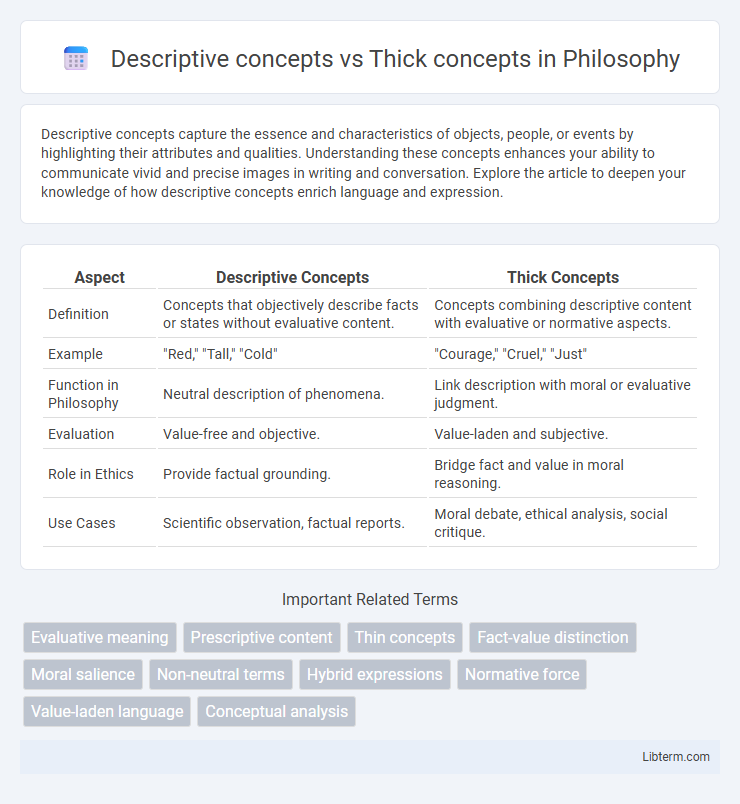Descriptive concepts capture the essence and characteristics of objects, people, or events by highlighting their attributes and qualities. Understanding these concepts enhances your ability to communicate vivid and precise images in writing and conversation. Explore the article to deepen your knowledge of how descriptive concepts enrich language and expression.
Table of Comparison
| Aspect | Descriptive Concepts | Thick Concepts |
|---|---|---|
| Definition | Concepts that objectively describe facts or states without evaluative content. | Concepts combining descriptive content with evaluative or normative aspects. |
| Example | "Red," "Tall," "Cold" | "Courage," "Cruel," "Just" |
| Function in Philosophy | Neutral description of phenomena. | Link description with moral or evaluative judgment. |
| Evaluation | Value-free and objective. | Value-laden and subjective. |
| Role in Ethics | Provide factual grounding. | Bridge fact and value in moral reasoning. |
| Use Cases | Scientific observation, factual reports. | Moral debate, ethical analysis, social critique. |
Introduction to Descriptive and Thick Concepts
Descriptive concepts provide objective, value-neutral information that explains or categorizes phenomena based on observable features, such as the concept of "water" describing its chemical composition. Thick concepts combine descriptive content with evaluative or normative dimensions, exemplified by "bravery," which involves both the observation of daring acts and the positive moral judgment attached to them. Understanding the distinction between descriptive and thick concepts clarifies how language can simultaneously convey factual and ethical perspectives in philosophical analysis.
Defining Descriptive Concepts
Descriptive concepts refer to terms that objectively describe features or facts without embedding moral or evaluative judgments, such as "water" or "triangle," providing clear criteria for classification based on observable properties. These concepts function primarily in empirical and scientific contexts, enabling precise communication and analysis through measurable characteristics. Defining descriptive concepts requires specifying necessary and sufficient conditions that unambiguously identify instances within a category, ensuring clarity and consistency across discussions.
Understanding Thick Concepts
Thick concepts combine descriptive content with evaluative or normative aspects, making them essential for understanding moral and social phenomena. Unlike descriptive concepts that provide objective details, thick concepts such as "courage" or "cruelty" convey both factual information and value judgments simultaneously. Grasping thick concepts requires recognizing how their meaning is inseparable from the ethical perspective embedded within them, which enriches interpretation and discourse in philosophy and everyday communication.
Key Differences Between Descriptive and Thick Concepts
Descriptive concepts provide objective, value-neutral information about phenomena, focusing solely on observable features without judgment, such as "water" or "tree." Thick concepts combine descriptive content with evaluative or normative dimensions, like "cruelty" or "bravery," which include both factual descriptions and moral or emotional assessments. The key difference lies in their evaluative component: descriptive concepts maintain neutrality, whereas thick concepts embed ethical or attitudinal significance alongside factual description.
Historical Background and Philosophical Roots
Descriptive concepts trace their origins to early analytic philosophy, emphasizing objective, value-neutral classification based on observable facts, as seen in the works of Bertrand Russell and Gottlob Frege. Thick concepts, emerging prominently in moral philosophy through thinkers like Bernard Williams and Iris Murdoch, intertwine descriptive content with evaluative significance, reflecting cultural, ethical, and historical contexts. The philosophical roots of thick concepts reveal debates on objectivity and moral realism, contrasting with the empirical rigor favored in descriptive conceptual analysis.
Examples of Descriptive vs Thick Concepts
Descriptive concepts, such as "water" or "tree," refer to observable and objective features without embedded evaluations, while thick concepts like "courage" or "cruelty" simultaneously convey descriptive content and ethical or evaluative significance. For example, "justice" exemplifies a thick concept combining factual elements about fairness with moral judgment, contrasting with purely descriptive terms like "red" or "large" that lack evaluative aspects. Thick concepts play a crucial role in ethical discussions by integrating factual descriptions with normative meaning, unlike descriptive concepts that serve purely informative functions.
The Role of Evaluation in Thick Concepts
Thick concepts inherently combine descriptive content with evaluative components, reflecting both factual properties and moral or normative judgments. Unlike purely descriptive concepts that focus on objective characteristics, thick concepts require interpretative engagement to assess their evaluative meaning within specific social or cultural contexts. This dual nature allows thick concepts to play a critical role in ethical discussions, where evaluation shapes understanding beyond mere description.
Debates Surrounding Concept Division
Debates surrounding the division between descriptive and thick concepts focus on whether thick concepts contain inherent evaluative content or if they can be fully captured by purely descriptive terms. Proponents argue that thick concepts, such as "courage" or "cruelty," merge factual and moral dimensions, making their categorization controversial in ethics and language philosophy. Critics challenge this blending, suggesting a clearer, more distinct separation is necessary to preserve analytical clarity and avoid conflating descriptive facts with normative judgments.
Implications for Ethics and Philosophy
Descriptive concepts convey factual, objective information about the world, while thick concepts combine descriptive content with moral or evaluative significance, influencing ethical judgments. In ethics and philosophy, thick concepts challenge the separation between facts and values, implying that understanding moral phenomena requires integrating descriptive accuracy with normative assessment. This integration affects how philosophers approach moral discourse, decision-making, and the justification of ethical principles.
Conclusion: Significance and Future Directions
Descriptive concepts provide objective, value-neutral descriptions, while thick concepts combine descriptive content with evaluative significance, bridging facts and values in moral and social analysis. Recognizing the interplay between these concepts enhances ethical reasoning, linguistic analysis, and cross-cultural understanding, highlighting their importance in philosophy and cognitive science. Future research should explore the cognitive mechanisms behind thick concepts and their role in practical decision-making and moral communication.
Descriptive concepts Infographic

 libterm.com
libterm.com